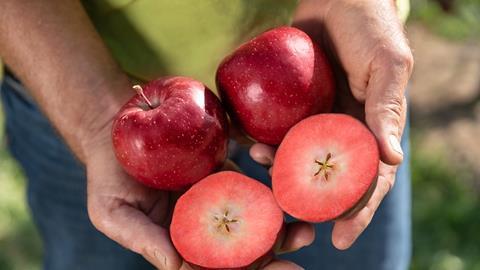Worldwide Fruit’s commercial director Hannah McIlfatrick reflects on the journey so far for the red-fleshed apple brand in Britain
How have sales of Kissabel evolved since the range’s UK launch in 2022?
Sales are growing rapidly as the volume of fruit increases each year. The trees are still young and haven’t reached full production yet. We expect to double our sales of Kissabel in 2023 versus 2022.
How has Kissabel been affected by UK weather challenges in the past two growing seasons?
The technical team work hard to ensure rigorous standards are delivered for Kissabel. It is a premium variety, therefore all the focus is on the quality of the flavour. We have had some outstanding customer feedback. That said, the weather can be a challenge, but we need to adapt and learn.
What do you think needs to be done to boost awareness of the Kissabel brand in Britain?
As a relatively new brand, we need to build awareness. Kissabel is only available for a limited period of time, so it’s important to inform our customers when the fruit is coming and to highlight what’s great about the product.
What were Kissabel’s most interesting and impactful UK marketing activities in 2023?
The best campaigns have been the omnichannel campaigns that have allowed us to inform our customers about Kissabel across multiple channels. The unique red flesh of Kissabel apples makes them a fantastic product to start the day with and brighten up your breakfast.
Do you think Kissabel can one day achieve the same success as rival apple brands such as Pink Lady and Jazz? What have these brands done well that Kissabel could emulate?
Jazz and Pink Lady are fantastic apples, and they are available 52 weeks of the year. To raise awareness and build repeated purchase, we need to increase the availability and weeks supplied. As availability increases, we can increase our marketing and build brand awareness.
Research by British Apples & Pears recently revealed that over the two years since 2021, British apple growers have, on average, faced a 30 per cent increase in production costs but received just an eight per cent rise in returns from the supermarkets. To what extent do premium varieties like Kissabel help growers make a higher margin, thereby boosting the apple sector’s sustainability?
Growers take a risk planting new varieties as we can never be 100 per cent certain of their success over the life of the tree. Apples like Kissabel, which offers a clear point of differentiation with its red flesh, have grown the total apple category – which is our ambition – rather than displacing sales of other varieties. We therefore believe Kissabel will support the long-term sustainability of British topfruit.
Are there plans to develop any new varieties of Kissabel to add to the Rouge, Orange and Jaune varieties already available?
Absolutely. There are several very exciting new varieties coming forward in the Kissabel collection.




